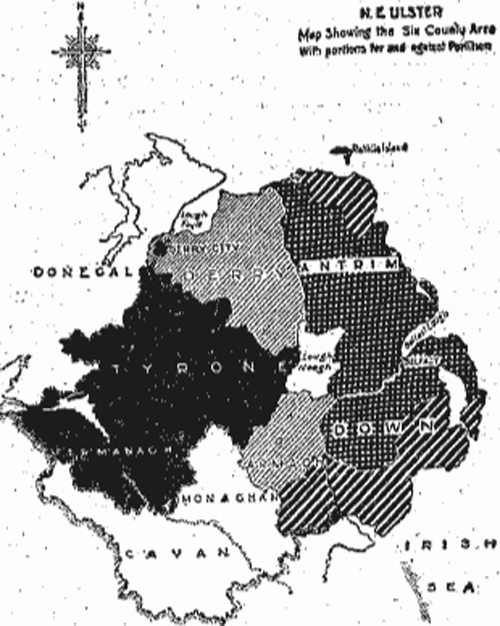Northern border the outstanding problem for 1923 as prospect of customs barrier is raised
Dublin, 27 December 1922 – As one historic year draws to a close and a new year is set to commence, the issue of the border between north and south remains the one great national problem to be solved.
The Freeman’s Journal reports today that while the great hope for 1923 is that the new Free State will stabilise and succeed in the reconstruction of national life, its true limits have yet to be defined. Article 12 of the Anglo-Irish Treaty provides that, in the event – as has now happened – that both houses of the Northern Ireland Parliament opt out of the jurisdiction of the Irish Free State, that a commission of three persons – one from the north, one from the south and one chosen by the British government – be appointed to ‘determine in accordance with the wishes of the inhabitants, so far as may be compatible with economic and geographic conditions, the boundaries between Northern Ireland and the rest of Ireland’.
The Northern Irish administration has indicated that it will ignore this commission. Northern Ireland is made up of six of the nine counties of Ulster. Unionist majorities exist in only four of these. Nationalists favouring inclusion in the Irish Free State – who account for 34.4% of the overall Northern Ireland population – are in the majority in such areas as Tyrone, Fermanagh, South Armagh, East and South Down, North Antrim and Derry City. These realities ensure, as the Freeman’s Journal has today headlined, that the Boundary Commission’s work ‘cannot be torpedoed.’
The issue of jurisdictional reach of the new state came into sharp focus in the run-up to Christmas when the Dáil considered legislation that raised the prospect of a customs border barrier on the island. During discussions on the adaptation of the British Enactments Bill, it was suggested that the Minister for Finance ‘may make regulations to apply to the importation and exportation of any goods into and from the Irish Free State by land and of the provisions of the Customs Act, subject to such modifications as may be necessary and in particular, may… prohibit the importation and exportation of all goods or any classes of goods except by such routes within the Irish Free State, and during such hours as may be prescribed.’
British Pathé footage from 1922 of an Irish Republican Army guard on the border between north and south
The problems of policing the flow of goods across the island was noted by a number of speakers in the course of that discussion. National University TD Prof. William Magennis noted that unless the minister was authorised to decide through what particular points certain traffic should pass, ‘it would be necessary to have the very extensive and practically unworkable arrangement of a series of custom houses all along the line of the northern boundary’. Labour leader, Thomas Johnson also remarked upon the difficulties involved, stating that the Oireachtas was being asked to ‘give power to the minister to make regulations which it is quite impossible to enforce and it will be just as impossible for the northern minister as it is for himself.’
TD for Cavan Seán Milroy said, in effect, that the creation of a customs barrier on the island was in fact crucial to the future political unity of the island. If the Free State government was going to ‘deal effectively with the situation in the north’, he said, it was essential that it had the powers that were being proposed. He told the Dail:
‘The government, I think, should have power to prohibit the importation or exportation, not only of dutiable goods, but of all commodities to and from the Free State. There is more in that than reaches the eye at the first glance, and the value of that power, I think, only time will disclose. But, if we are to be in a position as a government – a state – to maintain our rights, and to create an atmosphere that may be conducive to the eventual unity of the whole country, I believe that power in the hands of the government is an absolute essential, and I strongly support the government in their demands.’
At a subsequent meeting of Derry Corporation, a resolution was passed protesting the partition of Ireland. The debate saw the city’s nationalist mayor, Hugh O’Doherty, refer to looming issues around dealing with the Free State in regard to customs and excise and other issues that could give rise to friction.
Unionist members of the corporation left the meeting during the discussion.
[Editor's note: This is an article from Century Ireland, a fortnightly online newspaper, written from the perspective of a journalist 100 years ago, based on news reports of the time.]





















